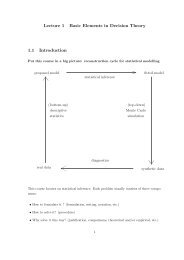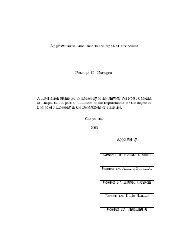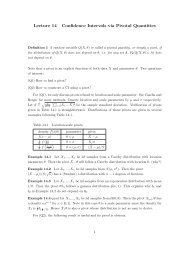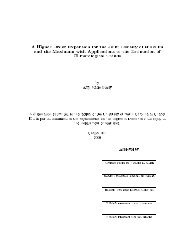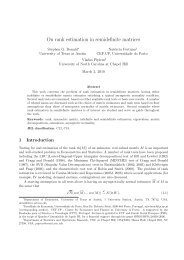Monte Carlo Methods in Statistical Mechanics: Foundations and ...
Monte Carlo Methods in Statistical Mechanics: Foundations and ...
Monte Carlo Methods in Statistical Mechanics: Foundations and ...
Create successful ePaper yourself
Turn your PDF publications into a flip-book with our unique Google optimized e-Paper software.
This theorem shows that the Markov cha<strong>in</strong> converges as t !1to the equilibrium<br />
distribution , irrespective ofthe <strong>in</strong>itial distribution . Moreover, under the conditions<br />
of this theorem much more can be proven | for example, a strong law of large numbers,<br />
a central limit theorem, <strong>and</strong> a law of the iterated logarithm. For statements <strong>and</strong> proofs<br />
of all these theorems, we refer the reader to Chung [6].<br />
Wecannowseehowtosetupadynamic <strong>Monte</strong><strong>Carlo</strong>method for generat<strong>in</strong>g samples<br />
from the probability distribution . It su ces to <strong>in</strong>vent a transition probability matrix<br />
P = fpxyg = fp(x ! y)g satisfy<strong>in</strong>g the follow<strong>in</strong>g two conditions:<br />
(A) Irreducibility. 3 For each pair x y 2 S, there exists ann 0 for which p (n)<br />
xy<br />
(B) Stationarity of . For each y 2 S,<br />
X<br />
x<br />
> 0.<br />
x pxy = y: (2.6)<br />
Then Theorem 1 (together with its more precise counterparts) shows that simulation of<br />
the Markovcha<strong>in</strong> P constitutes a legitimate<strong>Monte</strong> <strong>Carlo</strong> method for estimat<strong>in</strong>gaverages<br />
with respect to .Wecanstart the system <strong>in</strong> any state x, <strong>and</strong>the system is guaranteed<br />
to converge to equilibrium ast !1[at least <strong>in</strong> the averaged sense (2.4)]. Long-time<br />
averages of any observable f will converge with probability 1to -averages (strong<br />
law of large numbers), <strong>and</strong> willdosowith uctuations of size n ;1=2 (central limit<br />
theorem). In practice we will discard the data fromthe <strong>in</strong>itial transient, i.e. before the<br />
system has come close to equilibrium, but <strong>in</strong> pr<strong>in</strong>ciple this is not necessary (the bias is<br />
of order n ;1 ,hence asymptotically much smaller than the statistical uctuations).<br />
So far, so good! But while this is a correct <strong>Monte</strong> <strong>Carlo</strong> algorithm,itmay or may<br />
not be an e cient one. The key di culty isthat the successivestates X0 X1 :::of the<br />
Markov cha<strong>in</strong> are correlated |perhaps very strongly | so the variance of estimates<br />
producedfromthe dynamic <strong>Monte</strong> <strong>Carlo</strong>simulation may be much higher than <strong>in</strong> static<br />
<strong>Monte</strong> <strong>Carlo</strong> (<strong>in</strong>dependent sampl<strong>in</strong>g). To make this precise, let f = ff(x)gx2S be a<br />
real-valued function de ned on the state space S (i.e. a real-valued observable) that is<br />
square-<strong>in</strong>tegrable with respect to . Now consider the stationary Markov cha<strong>in</strong> (i.e.<br />
start the system <strong>in</strong> the stationary distribution ,orequivalently, \equilibrate" it for a<br />
very long time prior to observ<strong>in</strong>g the system). Then fftg ff(Xt)g is a stationary<br />
stochastic process with mean<br />
f<br />
hfti = X<br />
x<br />
x f(x) (2.7)<br />
3 Weavoid the term \ergodicity" because of its multiple <strong>and</strong> con ict<strong>in</strong>g mean<strong>in</strong>gs. In the physics<br />
literature, <strong>and</strong> <strong>in</strong>the mathematics literature on Markov cha<strong>in</strong>s with nite state space, \ergodic" is typically<br />
used as a synonym for \irreducible" [4, Section 2.4] [5, Chapter 4]. However, <strong>in</strong> the mathematics<br />
literature on Markov cha<strong>in</strong>s with general state space, \ergodic" is used as a synonym for \irreducible,<br />
aperiodic <strong>and</strong> positive Harris recurrent" [7, p.114][8, p. 169].<br />
5



